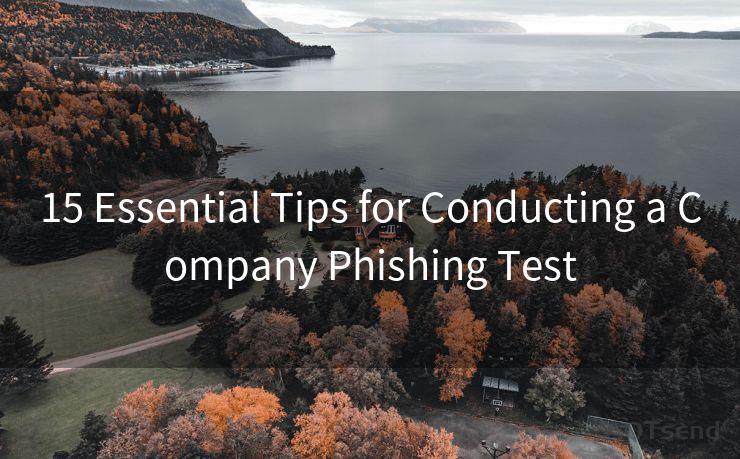15 Essential Tips for Conducting a Company Phishing Test




When it comes to cybersecurity, phishing attacks are among the most common threats faced by organizations today. To protect against these attacks, conducting a phishing test within your company is crucial. Here are 15 essential tips to help you effectively carry out a phishing test in your organization.
1. Define Clear Objectives
Before conducting a phishing test, it's essential to define clear objectives. Determine what you want to achieve with the test, such as assessing employee awareness, identifying vulnerable areas, or evaluating the effectiveness of your security training.
2. Obtain Necessary Permissions
Make sure you have the necessary permissions from senior management or the IT department before conducting the phishing test. This ensures that the test is conducted ethically and without any legal repercussions.
3. Use Realistic Scenarios
Create phishing emails that mimic real-world scenarios to make the test more effective. Use common phishing techniques, such as fake invoices, urgent requests, or prize notifications, to simulate actual attacks.
4. Target a Representative Sample
Instead of sending phishing emails to the entire organization, target a representative sample of employees. This helps in managing the test more efficiently and provides a good indication of the overall awareness level within the company.
5. Educate Employees Beforehand
Inform employees about the upcoming phishing test and educate them on the importance of being vigilant. This helps in creating a more realistic test environment and encourages employees to participate actively.
6. Measure Response Times
Track and measure the response times of employees to the phishing emails. This data can provide valuable insights into how quickly employees identify and report suspicious emails.
7. Provide Feedback and Training
After the test, provide feedback to employees on their performance. Use this opportunity to reinforce security best practices and offer additional training if needed.
🔔🔔🔔
【AOTsend Email API】:AOTsend is a Managed Email Service for sending transactional emails. Support Email Types: reminders, authentication, confirmations, notifications, verification codes, invoices, password resets, account activations, billing statements, two-factor authentication (2FA), and one-time passwords (OTP) emails, etc. $0.28 per 1000 Emails. 99% Delivery, 98% Inbox Rate.
You might be interested in:
Why did we start the AOTsend project, Brand Story?
What is a Managed Email API, How it Works?
Best 25+ Email Marketing Platforms (Authority,Keywords&Traffic Comparison)
Best 24+ Email Marketing Service (Price, Pros&Cons Comparison)
Email APIs vs SMTP: How they Works, Any Difference?
8. Analyze the Results
Carefully analyze the results of the phishing test to identify common mistakes, vulnerable groups, and areas where additional training is required.
9. Adjust Security Policies
Based on the test results, adjust your organization's security policies to address any identified weaknesses. This may include updating email filters, improving employee training programs, or implementing multi-factor authentication.
10. Use a Variety of Phishing Techniques
Incorporate different types of phishing techniques in your test, such as spear-phishing, whaling, and clone phishing, to ensure employees are prepared for a wide range of attacks.
11. Make it Challenging
While it's important to keep the test realistic, don't make it too easy for employees to identify the phishing emails. This helps in assessing their ability to spot more subtle and convincing attacks.
12. Encourage Reporting
Encourage employees to report any suspicious emails they receive, even if they're not sure if it's a phishing attempt. This fosters a culture of vigilance and proactive security within the organization.

13. Follow Up with Additional Tests
Conduct follow-up phishing tests periodically to assess the effectiveness of your security measures and employee training. This helps in identifying any new vulnerabilities that may arise.
14. Utilize Automated Tools
Consider using automated tools for conducting the phishing test. These tools can help in creating realistic phishing emails, managing the test, and analyzing the results more efficiently.
15. Communicate the Results
Finally, communicate the results of the phishing test to all employees. Share the key findings, highlight successful identifications, and discuss the importance of remaining vigilant against phishing attacks.
By following these 15 essential tips, you can effectively conduct a company phishing test and enhance your organization's cybersecurity posture. Remember, the key to success lies in continuous education, awareness, and proactive measures to mitigate the risks posed by phishing attacks.




Scan the QR code to access on your mobile device.
Copyright notice: This article is published by AotSend. Reproduction requires attribution.
Article Link:https://www.mailwot.com/p1913.html



